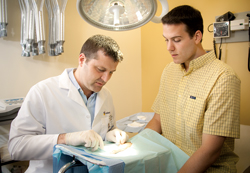Bringing comfort to patients through palliative care
A primary care internist with a background in hospital medicine, hospice care and psychiatry explains how he grew an inpatient consult service to include outpatient services, home services and research programs.
Timothy E. Quill, FACP
Occupation: Professor of medicine, psychiatry and medical humanities; head of the Center for Ethics, Humanities and Palliative Care at University of Rochester Medical Center, N.Y.
Age: 60.
Current residence: Rochester, N.Y.
Family: Wife Penny, two daughters in medicine (one a fellow in pulmonary/critical care, one a nurse in the emergency department) and a stepdaughter at home.
Education: University of Rochester, then fellowship in biopsychosocial medicine at University of Rochester.
Something I wish I'd learned in medical school: There was not a lot of training in palliative care.
I became an internist because: I was originally thinking I would go into psychiatry. I'm one of those strange people who loved my internal medicine internship. I very much enjoyed the interactions with patients and families and addressing their disease-related problems, so I figured I would finish residency in internal medicine and then I did this fellowship in biopsychosocial medicine, which took place in the interface between internal medicine and psychiatry.
First job: I became a primary care internist with a substantial hospital-based practice, and I was a hospice medical director at the same time.
Most rewarding aspect of your work: I work primarily in palliative care now and we have very intense interactions with patients and families, trying to come to grips with what's really going on with their disease and their prognosis. Those encounters are very rich and engaging and important and somewhat rare in big medical centers. You have a lot of different people involved but nobody putting together the big picture.
Most meaningful professional accomplishment: I started a palliative care program in 2001. Seeing that grow from an inpatient consult service to a full-service palliative care program with an inpatient unit and outpatient services, home services, educational programs and research programs, that's been very satisfying.
Future goals: Making sure the program keeps going as I retire—developing an infrastructure and a group of dedicated clinicians, teachers and researchers to move forward with the program. And to continue trying to keep patients in the driver's seat as they get sicker.
Hardest medical lesson learned: Learning how to work as a consultant rather than the primary physician has been a challenge. As a consultant, you really have to cater to the needs of a very diverse group of clinicians as well as patients and families.
Personal heroes: I'm still pretty enamored of [President Barack] Obama and what he's had to overcome to get where he is. One of my mentors, Art Schmale, MD, who trained both as an internist and as a psychiatrist and who was a pioneer in both palliative and end-of-life care. He was doing palliative care before it was defined as palliative care so I was lucky to have encountered him while in medical school and residency.
Pet peeves: Whining, whether it comes from my children, my colleagues, my patients or myself.
Most meaningful non-medical accomplishment: Raising my daughters and watching them and helping them grow, and now raising my brain-injured stepdaughter.
Most surprising thing about me: I've run 10 marathons, starting at the age of 50.
If I weren't a physician, I would be: A forest ranger.




